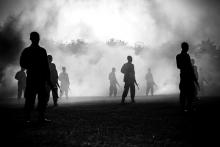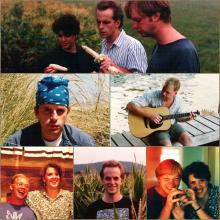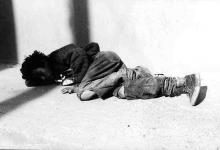poem

When we lose our dreams
To be educated
And are afraid
Of being incarcerated
We pray to you
Dios te salve, María,
When we don’t know
Where to go
To be a Sitting Bull
Or a Standing Rock
We pray to you
llena eres de gracia,
When your naturaleza
Showed us no mercy
And the politicians
Shut down our Borinquen
We pray to you
el Señor esta contigo.
When we’ve picked
All the grapes
Without an actual
Bathroom break
We pray to you
Bendita eres
When our hermanas Negras
Are being maimed
And ashamed
By racism, sexism, bigotry
We pray to you
entre todas las mujeres,
When we fight for
Farm workers’ rights
While hiding from
Our men’s grips at night
We pray to you
y bendito es el fruto

Our thoughts and prayers are fleeting breath.
If we just dream of what could be
And do not build community,
And do not seek to change our ways,
Our dreams of change are false displays.

We’re made in the image
The Message expresses,
The Good News attests
That we’re formed out of sod,
That we’re made every one

There’s a photo he carries for long journeys
like this one, for trips on loaded market lorries
where the passengers take their seat, perching
on top of cargo, or sitting on crude benches
inside the buses coming from Sudan with names
like “Best of Luck” or “Mr. Good Looking.”

The Greeks know how tightly coiled
are circumstances with many windings
before tragedy’s spring snaps.
The horse bolts flame-like from the gate;
we do not see its years of training.
So too, the thunderhead today slow bloating
and thickening with muffled rumblings.
The steeds were restless, but the reins
held tight, until a crack of the whip
unleashed the pummeling flood.

You hear a voice speaking
about a bird dragging its dark universe
of feathers across your yard,
and you realize it must be you
telling the boy how you carried its body
beyond the ambit of your dogs.
One eye, round as a coin,
fixing fear upon you, the other,
half shut. How the bird hauled
its body back into your yard,
dying with a will you could only
admire. Am I the bird?, the boy asks.

Mother, mother / There’s too many of you crying / Brother, brother, brother / There’s far too many of you dying —Marvin Gaye
then they stomped
John Willet
as he lay on the sidewalk
hands cuffed behind his back
and shot
Michael Brown
who was on his way this fall to college
Stop and frisk
Stop and frisk
and used a chokehold to kill

The tale of nails and wood
is retold on the BBC from Winchester,
with hymns about a balm in Gilead,
a wondrous cross, and the choirboys’ echo
of the Fauré Requiem. Cardinal Newman
sends blessings from the grave,
and the organ grumbles “Amen.”

After the monsoon, after work, I catch
you with your face in the hot laundry,
the syntax of spring held together by sap,
hanging wild and worried and crazy
in the lowest branch. In the ripe country,
salmon fold over the linens of the bay,
and I weep with you from the shore, embodied.
For still you feel the fell of dark, not day.


In the northern Pacific Ocean, there is a giant whale named 52 Hertz. Scientists named him that because when he sings, the frequency of his whale song is around 52 Hertz. When other whales sing their songs, they sing at frequencies between 15 and 25 Hertz. His song cannot be heard by any other whale. He is known as the loneliest whale in the world.
Normally whales are communal creatures. They live their lives in family groups. They migrate from warm waters to cooler waters to give birth and find food. They follow the same migration route from year to year. 52 Hertz is different. He lives alone. He does not follow a migration route. He wanders the ocean, a lonely, wandering whale.
We do not know what kind of whale 52 Hertz is. He could be a deformed blue or fin whale. He could be a cross breed of those two types of whales. He could be a kind of whale we have yet to discover. He is an unknown whale.
Soon a team will set out on a seven-week expedition in search of 52 Hertz. Will they find him? Will he find them? Does he want to be found? I wonder.

Chiamaka tells of women who plant seeds
of peace in tribal towns, pot-banging with spoons
to call men off their game of raid-and-rape.
A girl named Hope intercepts the hands
of crowing children trading blows
and coaxes them to shake their hands
although her own are quaking. At school
my shy daughter stuffs notes in friends’ lockers,
imploring playground harmony.
When most people think of Gaza, surfing is not the first thing that comes to mind. But photo journalist Ryan Rodrick Beiler has an eye for capturing the resilience and richness of life in this occupied land.

So,
No prom for you
Dear boy
No wedding
No children
No memories of you and family
For momma and daddy to savor
Just holes in their hearts to match
the hole
In yours
But as God is my witness
Sweet boy
You will never be forgotten

Car Trouble in Indiana
By Jennifer Grant
We’re happy fools, penniless as the corn
And just as content to watch the trucks barrel by.
The fan belt is jet black and frayed.
It’s chewed licorice.
And we might have to wait here all day.
My little brother's got the two things he needs:
A pack of Black Jack chewing gum
And his guitar.
He points at a billboard ‘cross the highway
And says if we had a dollar twenty-nine
And we were two miles up, we'd be knee-deep in hamburgers....

A note from the poet: Two years ago, our church opened its doors and began serving meals to our community. The immense and overwhelming feelings I felt scared me and so I penned them in this poem. Working with the poor among us has been eye-opening and has really pushed me to re-evaluate my thinking and life, for which I am immensely grateful.
~ The Rev. Dr. Martha FrizLanger
A new poem by Sarah Vanderveen...
I pulled on my wetsuit
quick, quick
pausing to take note
of a new hole under the left arm, darnit
and paddled out.